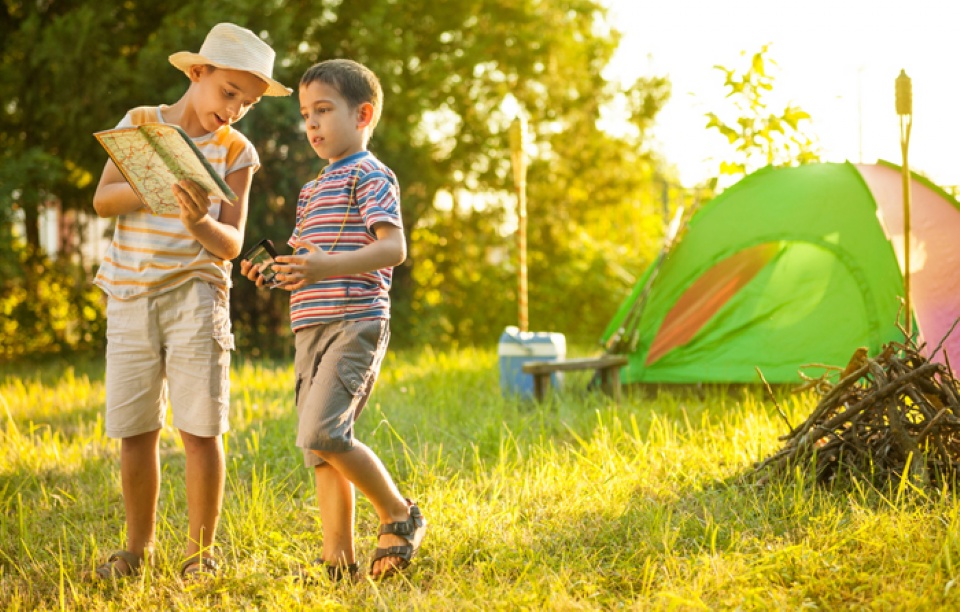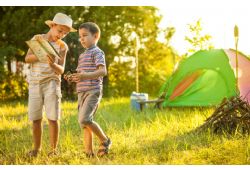More
than 4 million parents across Canada send their children to summer camp every
year. From 2000-2013 the numbers of
campers dropped by almost 10<>percentage<>. The
Canadian population is increasingly urban, diverse and technologically
dependant. Fewer and fewer Canadians
have had the childhood experience of going camping or going to a summer
camp.
With the above in mind, those who have been to
a summer camp (or have gone camping) know that spending time away in a remote location,
meeting new people, and taking on new
challenges is all part of the experience. This type of adventure early in life
brings about the inevitable struggles that encourage personal growth in areas
such as self-confidence and character development, which will help them become healthy
well-adjusted adults.
Those who experience the “planned deprivations”
of a summer camp are often nervous and apprehensive prior to camp. These “deprivations”
often include being in a remote location away from family and friends, support
groups, technology, and living in a “rustic” environment. In a short period of time, the contagious excitement
of the other campers combined with the positive camp atmosphere turns these “deprivations”
into “life-changers”. By the end of the
camp session the great unknown has become an irreplaceable network of friends
and shared experiences.
Our current prime minister began his career as
a camp counsellor in his teens, and is proud of that background. Camp counsellors are a special breed of young
adults who have taken on a high level of responsibility for others; they work
24/7 with their assigned youth, keeping in mind the philosophy of “ask, explain
and support”. They are models of positive energy, finding a balance in
competing interests (they try to organize groups of ten eight-year-olds at
different emotional, physical and intellectual stages by choosing an activity
during free time), while demonstrating a leadership style that encourages each
youth to be their own person with their own talents, strengths and weaknesses,
and a respect for those differences.
Spending a summer as a camp counsellor, working with youth, supporting
and encouraging these youngsters can be rewarding. These counsellors will
ultimately develop their own skills that will prepare them for their own
educational pursuits and future careers.
The campers and counsellors alike learn the
life lessons required for adulthood; the
difficulty in finding common grounds between opposing forces, how to come to
acceptable and respectful compromises, how to solve interpersonal conflicts, how
to differentiate between being “rude/mean/a bully”. All of these experiences accumulate over a
lifetime, or simply in the course of a summer season (they will build the
backbone and skill sets required for a successful adult life and future careers).
Summer camp is the core of life lessons which teach youth how to make decisions
and live with them. It provides opportunity for risk and trial/error in an
inclusive, supportive and forgiving environment. It is often a young person’s first experience
at having roommates― blending personal needs and wants with those of others
that are not part of their immediate families.
Whether spending the
summer as a counsellor or a camper, their lives have irrevocably changed. They have found the key to living together in
peace and harmony as a camp family, thus creating the bonds that last a
lifetime.
http;//www.statcan.gc.ca/pub/16-508-x/16-508-x2015003-eng.htm

 In The Latest Issue:Latest Issue:
In The Latest Issue:Latest Issue:
- A Bittersweet Farewell
- The new Laval Aquatic Co...
- The End of an Era:
Articles
Calendar
Virtual- ANNUAL TEACHER APPRECIATION CONTEST
- APPUI LAVAL
- ARTS & CULTURE
- CAMPS
- CAR GUIDE
- CCIL
- CENTENNIAL ACADEMY
- CHARITY FUNDRAISING
- CITYTV
- COSMODÔME
- COMMUNITY CONNECTIONS
- COVER STORY
- DINA DIMITRATOS
- ÉCOLE SUPÉRIEURE DE BALLET DU QUÉBEC
- EDITORIALS
- ÉDUCALOI
- EDUCATION
- EMPLOYMENT & ENTREPRENEURSHIP
- FÊTE DE LA FAMILLE
- FÊTE DU QUARTIER SAINT-BRUNO
- FAMILIES
- FESTIVAL LAVAL LAUGHS
- FÊTE DE QUARTIER VAL-DES-BRISES
- FINANCES
- GLI CUMBARE
- GROUPE RENO-EXPERT
- HEALTH & WELL-BEING
- 30 MINUTE HIT
- ANXIETY
- CHILDREN`S HEALTH & WELLNESS
- CLOSE AID
- DENTAL WELLNESS
- EXTREME EVOLUTION SPORTS CENTRE
- FONDATION CITÉ DE LA SANTÉ
- GENERAL
- HEARING HEALTH
- MESSAGES FROM THE HEALTH AGENCY OF CANADA
- MENTAL HEALTH
- SEXUALITY
- SOCIAL INTEGRATION
- SPECIAL NEEDS
- TEENS
- THE NUTRITION CORNER
- THE NUTRITION CORNER - RECIPES
- VACATION DESTINATION
- WOMEN'S FITNESS
- WOMEN'S HEALTH
- HILTON MONTREAL/LAVAL
- HOME & GARDEN
- INTERNATIONAL WOMEN'S DAY
- JAGUAR LAVAL
- LAVAL À VÉLO
- LAVAL FAMILIES TV SHOW
- LAVAL FAMILIES MAGAZINE CARES
- LAVAL URBAN IN NATURE
- LE PARCOURS DES HÉROS
- LES PETITS GOURMETS DANS MA COUR
- LEON'S FURNITURE
- LEONARDO DA VINCI CENTRE
- LFM PREMIERES
- LIFE BALANCE
- M.P. PROFILE
- MISS EDGAR'S AND MISS CRAMP'S SCHOOL
- MISSING CHILDREN'S NETWORK
- NETFOLIE
- NORTH STAR ACADEMY LAVAL
- OUTFRONT MEDIA
- PASSION SOCCER
- PARC DE LA RIVIÈRE-DES-MILLE-ÎLES
- PÂTISSERIE ST-MARTIN
- PIZZERIA LÌOLÀ
- PLACE BELL
- PORTRAITS OF YOUR MNA'S
- ROCKET DE LAVAL
- SACRED HEART SCHOOL
- SCOTIA BANK
- SHERATON LAVAL HOTEL
- SOCIÉTÉ ALZHEIMER LAVAL
- STATION 55
- STL
- SUBARU DE LAVAL
- TECHNOLOGY
- TEDXLAVAL
- TODAY`S LAURENTIANS AND LANAUDIÈRE
- TODAY`S LAVAL
- WARNER MUSIC
- THIS ISSUE
- MOST RECENT
Magazine
A Slice of the Rest of Your Life: an Experience from Summer Camp
Articles ~e 105,7 Rythme FM 4 chemins Annual Teacher Appreciation Contest Appui Laval Arts & Culture Ballet Eddy Toussaint Camps THIS ISSUE MORE...
CONTESTS Enter our contests
CONTESTS Enter our contests
CALENDAR
Events & Activities
COMMUNITY Posts Events
PUBLICATIONS Our Magazine Family Resource Directory
LFM BUSINESS NETWORK Learn more
COUPONS Click to save!
COMMUNITY Posts Events
PUBLICATIONS Our Magazine Family Resource Directory
LFM BUSINESS NETWORK Learn more
COUPONS Click to save!
SUBSCRIPTIONS
Subscribe to the magazine
Un-Subscribe
E-NEWSLETTER Subscribe to our E-newsletter Un-Subscribe
WRITE FOR US Guidelines & Submissions
POLLS Vote today!
E-NEWSLETTER Subscribe to our E-newsletter Un-Subscribe
WRITE FOR US Guidelines & Submissions
POLLS Vote today!
ADVERTISERS
How to & Media guide
Pay your LFM invoice
SUGGESTIONS Reader's Survey Suggest a Listing
LFM About Us Our Mission Giving Back Contact Us
SUGGESTIONS Reader's Survey Suggest a Listing
LFM About Us Our Mission Giving Back Contact Us
 PICK-UP LOCATIONS
Get a copy of LFM!
PICK-UP LOCATIONS
Get a copy of LFM!
TERMS & CONDITIONS Privacy | Terms
ISSN (ONLINE) 2291-1677
ISSN (PRINT) 2291-1677
Website by ZENxDESIGN





Tweet
Share